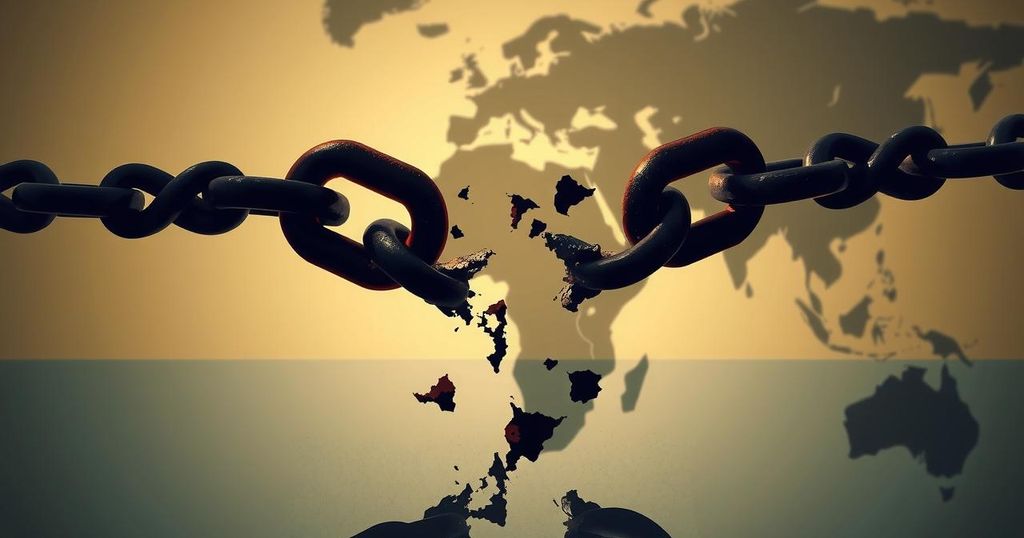Gaza Conflict: Egypt Faces Challenges in Balancing US Relations and National Interests
The ongoing Gaza conflict is straining Egypt-US relations, particularly after Trump’s controversial proposal to displace Palestinians into Egypt and Jordan. Egyptian officials express deep concerns about potential instability, while President Sisi launches diplomatic efforts to counter these ideas and develop a reconstruction plan for Gaza without displacing its inhabitants. Public sentiment leans towards rejecting external pressures, emphasizing the need for a just solution to the Palestinian situation.
Gaza’s plans are putting significant strain on Egypt-US relations amidst the ongoing conflict. In Cairo, many Gazans have sought refuge from the hostilities, deeply concerned about their families still in Gaza. Egyptian intelligence has been engaging with Hamas leaders to maintain a precarious ceasefire as millions of Egyptians become increasingly aware of their nation’s involvement in the war.
Compounding tensions, President Trump has proposed displacing two million Palestinians to areas in Egypt and Jordan, which has incited fears among Egyptians of a potential existential threat. Citizens like Abdo, a civil engineer, express strong opposition, claiming that such displacement would transform Egypt into a new battleground and provide a pretext for Israeli military action on Egyptian soil.
Moreover, the notion of permanently relocating Gazans is viewed as undermining Palestine’s quest for self-determination, potentially increasing extremism and instability within Egypt. In response, President Abdul Fattah al-Sisi has initiated a diplomatic effort, seeking to navigate a critical juncture in relations with the United States while maintaining national interests.
Egyptian officials are expressing their frustration, threatening to reevaluate the longstanding peace treaty with Israel, which has been a cornerstone of US influence in the region. Notably, prominent hosts like Ahmed Mousa criticize the value of American military aid, emphasizing a refusal to succumb to external pressure.
Contrasting Egypt’s approach, Jordan’s King Abdullah II welcomed Trump’s ideas with a more conciliatory tone, agreeing to assist Gazan children yet not endorsing the resettlement proposal. Reports indicate that Sisi may decline any visits to Washington while the idea of displacement remains on the table.
The war has adversely impacted Egypt’s economy, with losses in Suez Canal revenue reported to be around $8 billion due to attacks in the region. Egypt aims to develop its own reconstruction plan for Gaza, proposing a $20 billion initiative by a prominent tycoon to build homes without relocating Gazans.
Professor Mustafa Kamel al-Sayyid argues that finding safe areas within Gaza for temporary relocation during the rebuilding process is viable. Meanwhile, US Secretary of State Marco Rubio acknowledged Arab discontent with the proposed plan and called for better alternatives. An imminent Arab summit in Saudi Arabia, initiated by Egypt, aims to craft a comprehensive plan for Gaza’s recovery without sidelining Palestinian aspirations.
Challenges persist in formulating satisfactory agreements for the hardline Israeli government. Former Secretary of State Antony Blinken suggested an international role in Gaza until the Palestinian Authority could take over; however, Israeli Prime Minister Benjamin Netanyahu opposes PA involvement.
Egypt and its Arab allies remain committed to a two-state solution, advocating peaceful resolutions to the Palestinian issue while cautioning against the repercussions of historical errors. As Egypt currently assists over 100,000 Gazans, the potential for increased refugee influx raises fears of further destabilization due to Hamas’s ideological ties to the Muslim Brotherhood.
In light of these developments, there is substantial public support for Egypt to adopt a firm stance against the United States. Local citizens express concern over the strain that incoming refugees would place on their already burdened resources and reiterate that Palestinians deserve to remain on their own land, free from external impositions.
In summary, the Gaza conflict presents a complex challenge for Egypt, jeopardizing its relations with the United States while provoking fears of displacement and increased instability. President Sisi’s administration is actively seeking to assert its position, emphasizing the need for a comprehensive and just resolution to the Palestinian issue. The situation remains precarious as Egypt navigates these diplomatic tensions amidst its socio-economic struggles and public sentiment advocating for a strong stance against external pressures.
Original Source: www.bbc.com








Post Comment